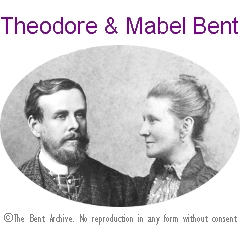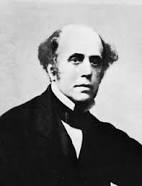
Mabel, Theodore, and Thomas Cook & Son
In the news once more, the seemingly persistent vicissitudes of the once-venerable Thos Cook & Sons (and all so symptomatic of British management for decades, especially in terms of brand stewardship) have sent the Bent Archive (late August 2019) back to Mabel’s diaries for references to the eponymous tour operator – for the couple, like thousands, tens of thousands, of travellers– relied upon Thomas Cook (1808-1892) for their occasional Nilotic episodes in the 1880s and ‘90s. The entrepreneur began his Egyptian tours in 1869.
Some background; Jan Morris, none better: “Thomas Cook, the booking clerk of the Empire… and ‘leave it to Cook’s’ had gone into the language. Cook’s had virtually invented modern tourism, and their brown mahogany offices, with their whirring fans and brass tellers’ cages, were landmarks of every imperial city. They held the concession for operating steamers on the River Nile: all the way up to Abu Simbel the banks of the river were populated by Cook’s dependents…’ (‘Pax Britannica, The Climax of an Empire’. London 1998, page 64)
The Bents’ first reference to the firm is in early 1885. Theodore and Mabel are off to explore the, then Turkish, Dodecanese, but opt to start with the steamer from Marseilles to Alexandria, via the Straits of Messina, and a brief detour to Egypt. Mabel busies herself with her diary:
“In the evening of Saturday [17th January 1885] we went out to see Stromboli. We could dimly distinguish the fire but when lightning swept low on the sea behind it the whole black form of the island was shown. We went very slowly, whistling through the Straits of Messina. We ought to have been in Alexandria on Tuesday but only got to the desired port about 2 o’clock on Wednesday [21st January], quite as glad to get into the Land of Egypt as ever the Children of Israel were to get out. We had our little feelings as we sat in a boat with a Union Jack and ‘Cook’s Tours’ upon it. We got through the custom-house very well and my box of photographic things was never opened anywhere though it was hastily put into a box with ‘Matière Explosive, Dynamite’ upon it.” (‘The Travel Chronicles of Mabel Bent, Volume 2, Africa’. Oxford 2012, page 6)
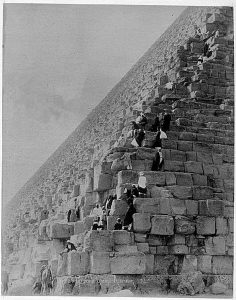
Moving on from the port of the famous Library, a few pages further in her diary Mabel details their sightseeing around Cairo – and, of course, at the Sphinx and its sentinels. Then, as now, tourists everywhere are suspended by their heels and well shaken; Mabel, in charge of the Bent coffers, is having none of it: “Monday 26th [January 1885]. By the bye, [Thomas] Cook, when asked, would send us to the Pyramids for £3 and I think we only paid £1 and 1 franc.” (‘The Travel Chronicles of Mabel Bent, Volume 2, Africa’. Oxford 2012, page 11)
The Bents’ first visit to Egypt was carefree and fun; Mabel’s diary pages read whimsically and breathless in 1885. Not so in 1898. Theodore’s (early, aged 45) death in May 1897 – Jubilee year – deprived Mabel of the focus for her life: the need to be somewhere else remained, but now with whom? And why? Typical of her she made plans immediately to visit Egypt on a ‘Cook’s’ tour in the winter of 1898 and chronicled the trip, ending with a return via Athens. The melancholy heading she gives this section of her diary is – ‘A lonely useless journey’. Her writing reveals her understandable depression. It makes unhappy reading, contrasting so markedly with her opening thrill of being in Cairo on that first visit with Theodore in 1885.
No doubt encouraged by her relatives, Mabel elected to put together for herself a ‘Cook’s Tour’ to Egypt and the Nile. But, often a mistake to revisit sites of earlier happiness, Mabel’s Egyptian pages echo a series of muted contrasts, sighs, and signs of near despair. That image of a confident, smiling Mabel climbing the Giza Pyramids on her birthday in 1885 is not the one that reappears as she groans ‘so sadly to Mr. Aulich’ of the Cairo Hôtel d’Angleterre, or rides ‘alone and unknown and unknowing’ around the great sites.
The famous travel company, however, is soon on the scene. They do their best to cheer her up: “Wednesday 19th [January 1898]. Port Said… We reached Ismailia about 10 p.m. I landed myself quite unaided and got to bed while the people [Thomas] Cook’s man was looking after, and a lady met by a government officer, were still in the custom house. I took a walk in the town next morning and started for Cairo… I was horrified by a note from Mr. Aulich, the manager of the Hôtel d’Angleterre, to say neither he nor the [Grand] Continental had a room and one had been taken in the Hôtel du Nil. I dined among many Germans, with their napkins tucked under their chins, leaving their elbows on the table and picking their teeth. My cupboard had such smoky coats hung in it that I dared not put in my dresses. Friday 21st [January 1898]. I went and groaned so sadly to Mr. Aulich that a garret was found for me – no bell or electric light – and thither I took myself before dinner. As I was in the Mouski, I thought I could walk in the bazaars so I put on my hat and made the best of my opportunity. Saturday 22nd [January 1898]. I went to Cook’s arsenal and chose a saddle to come with me with one of my own stirrups. On Saturday also I did all my final shopping and remembered when we were last here (or last but one). How we laughed …” (‘The Travel Chronicles of Mabel Bent, Volume 2, Africa’. Oxford 2012, page 268)
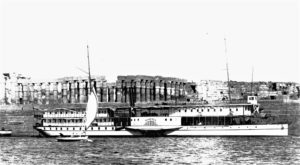
Mabel is writing on her Nile cruise boat. By 1904 the Cook Nile fleet comprised all these paddle-steamers (P.S.) for First Class passengers: ‘Rameses’ (236x30ft); ‘Rameses the Great’ (221x30ft); ‘Rameses III’ (200x28ft); ‘Amasis’ (170x20ft); ‘Prince Abbas’ (160×20 ft); ‘Tewfik’ (160x20ft); ‘Memnon’ (131x19ft). The steam ‘dahabeahs’ included the ‘Serapis’ (125x18ft); ‘Oonas’ (110x18ft); ‘Nitocris’ (103x15ft); and ‘Mena’ (100x18ft). Although Cook’s still have records for most of their steamers that travelled the Nile between 1890-4, they have no details for the period 1895-1900 and no booking records for Mabel’s journeys have been found (Cook’s Company Archivist, pers. comm., 2012).
Over the next few weeks (February 1898), Mabel makes several more references to Cooks as she visits the great sites and sights. The company, it seems, provides all comforts and care: “Thursday, February 3rd [1898]. Medinet Habou, Colossi, Dier el Bahàri, Gourna Ramesseum, and after tea I did the Luxor Temple alone; so nice and quiet and much less lonely than among so many strangers. Up to this we had awfully cold weather. I had, besides the Cook’s blanket and quilt, 2 blankets of my own, a shawl, dressing gown, newspaper, cloak and Ulster on my bed.” (The Travel Chronicles of Mabel Bent, Volume 2, Africa. Oxford 2012, page 270)
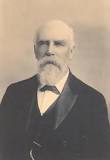
On 22 February 1898 she has a visit by the famous man himself: “Reached Luxor Tuesday evening, but did not go to live ashore at the Luxor Hotel till Wednesday. Mr. Cook came on board that evening with Major and Mrs. Griffiths, off his dahabeyah ‘Cheops’, which we had been towing all day. (‘The Travel Chronicles of Mabel Bent, Volume 2, Africa’. Oxford 2012, page 273)
Although with only a year to live, Mabel’s ‘Mr. Cook’ here is John Mason Cook (1834-1899), the only son of the founder, Thomas. The Luxor Hotel, to the east of Luxor Temple, was established by Cooks to accommodate the increasing number of tour groups along the Nile.
After Theodore’s death Mabel met the designer Moses Cotsworth in the Middle East and provided another Cook’s story. Moses had sailed to Beirut in December 1900 to visit the Sun Temple at Baalbek. In Beirut, he was ‘stranded in quarantine’ at Thomas Cook’s travel bureau. It was too late in the season for tourists to attempt the overland journey to Jerusalem and he was unable to afford a private guide. While waiting there he overheard a conversation between some other travellers who were also trying to attempt the same trip. Professor G. Frederick Wright and his son, Fred, were talking to Rossiter S. Scott from Baltimore, USA. They all wished to travel to Jerusalem. Wright invited Cotsworth to join their party as between them, and Scott, they could afford to hire a guide. The party set out for Damascus by the narrow-gauge railway over the mountains of Lebanon taking a slight detour for Cotsworth to visit Baalbek. By 17th December they had reached Damascus and organised a caravan of mules to carry them to Jerusalem. They had no tents but ‘depended on finding shelter wherever we should happen to be.’ In Hineh they sought shelter in the house of a Russian priest and had to remain there for two days to escape a snowstorm. Once on the move again they passed Lake Huleh where they were accosted by a Bedouin gentlemen who spoke English and asked them to drink coffee with him. The party then planned to visit the southern end of the Dead Sea. Wright recounted that ‘In this we were joined by Mrs. Theodore Bent, whose extensive travels with her husband in Ethiopia, southern Arabia, and Persia, had not only rendered her famous but fitted her in a peculiar manner to be a congenial and helpful travelling companion.’
Cook’s, of course, went bust inevitably and finally in September 2019 and future Mabels will no longer take to their beds, board, berths, flights, guides, and countless other services. Nor will their agents still greet them, smiling, at stations, harbour-sides, arrival gates, and pullman halts. Never more (unless reincarnated) will there be, Morris again, “Thomas Cook, the booking clerk of the Empire…”? All aboard? All abroad?
Mabel’s diary extracts are from Volume 2 of her Chronicles.
 Leave a comment or contact us about this article
Leave a comment or contact us about this article